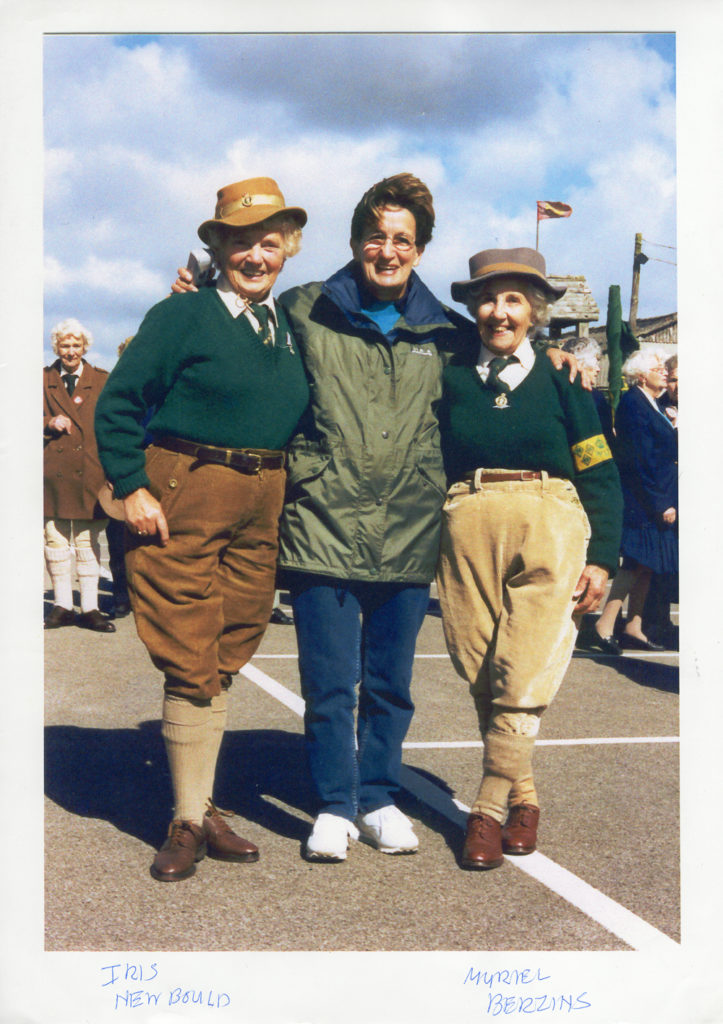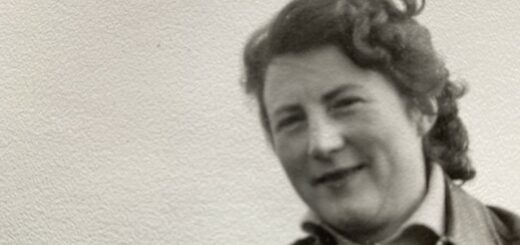Muriel Gertrude Berzins (née French)

“Sometimes, when I am trying to move something heavy, I wonder where the useful muscles I acquired working in the Women’s Land Army over 60 years ago went. I think I did every job there was on a farm, in spite of being under five feet tall.
Of course most of the men were doing some kind of war work, so it was up to us women to help to feed the nation. ln spite of all the hard work, living with 60 lasses in the army type huts was great fun, and made it worthwhile.
I wasn’t asked often to put a horse collar on a gentle giant of a shire horse, but I did manage it, stood on a box. How times have changed, you never see people in the fields nowadays, but I think I was lucky to, experience the old ways. Looking back on a field of rows of stooks of corn, barley and oats in the sunshine was a sight to behold.
Too bad one year 1944/45 I think it was a wet summer and we had to heave the sprouting sheaves up and hopefully put them up to dry.
Many hours I spent picking on a stack all day, passing the sheaves on to some old man to stack. One friend asked how she would get down when someone had moved the ladder. The farmer replied ‘just shut your eyes and walk about, you will soon get down’.
Oh how we looked forward to a drink of tea to wash the dust down, but only for Harvest and threshing. I usually got the worst job when threshing , raking out the chaff and pulves onto a hessian sheet, gathering the four corners, then slinging it over my back, it piled up only too quickly.
In 1949 I was threshing with my husband to be, who carried up the 18 or 20 stone bags of barley or wheat up the granary steps, we certainly earned every penny we got. My pay was £1.30 shilling after lodgings were paid.
Yes I did every job, ditching; dykeing; pulling sugar beet; hoeing mangolds (used for jam in the war); turnips; carrots; etc., the wettest job was chopping kale, the hardest, muck plugging (spreading manure to you). We had permanent backache from picking potatoes, six weeks over the riddling, then in the winter from potato clamps.
One Friday us five lasses put up five tons for the Hull market, we even hicked them up on the lorry, 8 stone then. However, after a quick wash and dinner, we used to go to the dances at the R.A.F. and other camps, and the pictures in Howden twice a week. 6pence or 9pence, great films that kept our morale up on fed up days.”
General Information
First Name(s): Muriel Gertrude
Unmarried Surname: French
Married Surname: Berzins (Latvian)
Date of Birth: 22.1.1924
Place of Birth: Hull (Kingston, Upon ) Yorkshire
Date of Death: 2023
Date Joined WLA: June 1943
Date Left: September 1950
WLA Number: 014872
Previous occupation: In service and shop work myself.
Reasons for joining: I wanted to live in the country and get away from the bombed out town of Hull.
Family’s reaction to joining: They wondered if I would be strong enough being under fit, but we soon developed muscles and I could lift 8 stone bags of potatoes on the weigh and work with horses.
Reasons for leaving: I got married to a wonderful Latvian ex-farmer who was a displaced person and had 63 wonderful years together.
Employment
No pre-war training. Worked for East Riding County War Agricultural Committee. Worked at different farms weekly, including the Atkinsons. Worked in Howden, near Goole, Yorkshire. Travelled by bike or lorry.
Worked sometimes on greenhouses on tomatoes and grapes, but only in the Howden area, George Thomas.
Worked/shared accommodation with:
- Nellie Dickinson
- Mary Sands
- Betty and Joyce Martin
- Ann and Doreen Currins
- Ann Bayram
- Gwen Rhodes
- Mabel Brown
- Jean Wharam
- Betty Parks
- Nancy Parker
- Rosemud Vicky Hultum
- Madge Pritchet
- Peggy Machin
- Dot Oxtoby
- Dorothy Oldfield
Type of work undertaken: Everything, all field work, ditching, dyking, hoeing, harvesting potatoes, carrots, flax, sugar beet, turnips, mangolds, hay packing, stacking, threshing, mucking out foal yard, calves, pigs etc piddling potatoes.
Work liked most and least: I enjoyed hoeing, being in a gang, we would sing a lot, looking after tomatoes and grapes, stacking sheaves. Hated pulling carrot, sugar beet, unloading shoddy, taking chaff from the threshers etc.
Any accidents or injuries sustained by you or by fellow workers and what effect they had: My friend, Dot had a fork prong put up her nose, Madge fainted but it healed before she married. One had a rib broken landing on a fork off a stack, felt sick doing rotten carrots, hated repairing railway sacks.
Best and worst memories of time: It was awful chopping down kale in winters, only one hot drink a day except when harvesting or threshing, so cold doing slow jobs.
Loved hay making and swapping stories with pals made for life. Sometimes meals were bad, we even went on strike!!

Accommodation
Lived in Howden Hostel, similar to army flats with zinc roofs. 2 dormitories with bunk beds, after several weeks sleeping in a billet 4 girls in 2 beds, strangers.
Life after the war
I left the WLA in 1950 married the lived on a farm in a tied cottage.
Did you return to your pre-war occupation? No. I worked on a farm. My brother was in the Army then worked in Cod Liver Oil Factory after being in munitions. married a soldier.
What was your occupation after the war? As above. Worked on the farm in an isolated place and helped in the farm house.
Did you stay on the land? Yes. I did my Latvian husband used to make and top wonder stacks.
Further information
How did work in the WLA / WTC effect your/ their life? I had back trouble for several years probably from 6 weeks at a time picking potatoes and pulling sugar beet etc. We were very poor but grew our own food made our furniture etc and was happy.

Muriel pushed the lazer button to cut the memorial out at Campbells in Hull. The sculptor, Peter (pictured), then took Muriel and her fellow WLA veterans to Scotland to see it.
Opportunities to meet other Land Girls working elsewhere, locally, during wartime. If so where?: We had rat catchers in the hostel. Met at dances in Budwith and at blood donations centres in the base station, Hull, every Sunday evening going back to work. We were not welcome in canteens of Nafis.
Reactions of local people towards WLA: They thought that we were doing a good job. Some teased us a lot. We were very green and innocent but soon learnt how to cope with Italians, Irish and Eastern Europeans.
Treatment by farmers or market gardeners: Most were grateful for our help but worked us very hard. Very few asked us indoors we lunched in the barns etc. One family asked me to tea one Sunday.
Any outstanding events or achievements in WLA: The W.I didn’t welcome us at all, but I joined here and enjoyed winning trophies and cups for crafts and cooking, getting to finals in quizzes for prizes etc. I enjoyed painting and have visited many countries including Latvia when the Iron Curtain ascended.
Any other comments on time in the WLA: The friends I made were and are fantastic. We became Godparents, although not living near. I became independent, healthy and strong, rode a bike up to 90 years. I have supple hands and feet and my nerves. Tried never to waste food that God sends.
We knew so much about each other waiting anxiously for news about boy friends who were in Japanese Prison Camps, lost at sea, emotions ran high at times.
One winter they got a blind in and we learnt how to make potato baskets and sewed filthy railway sacks.
The hostel was flooded in 1947.
Visit the BBC’s WW2 People’s War website to read more about Muriel’s wartime experiences.


